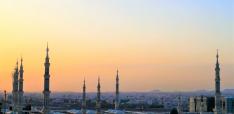Is the EU shortsighted on Iran? After nearly a decade of nuclear talks, the Union risks missing the bigger picture
Next week, on 12 December (or 12/12/12 for numerophiles), the European Parliament (EP) will hand its prestigious Sakharov Prize for Freedom of Thought to two Iranians, jailed lawyer Nasrin Sotoudeh and film-maker under house arrest Jafar Panahi. Both will have to send a representative as the Iranian regime, unsurprisingly, does not allow them to travel. (It would not even let a scheduled EP delegation see the two activists, which led to the cancellation of the trip altogether.) Thus, two days after the EU will receive the Nobel Peace Prize for its own achievements, Europeans can feel to be on the right side of history – promoting peace themselves and supporting the oppressed fighting for freedom. But are things that simple?
At least, there is much more in the picture than just a good-doing EU. In fact, for about a decade now, the EU’s relations with Iran have been marked not by human rights issues (of which there is no dearth to address) but by what is simply termed „the nuclear issue“. Quite exactly ten years ago, in August 2002, the world learned about a clandestine Iranian nuclear programme through revelations of an exiled dissident group. Ever since the foreign ministers of France, Germany and the United Kingdom (come to be known as the EU-3) took out on a diplomatic initiative with Iran to resolve questions about its nuclear program, this matter has remained on the top of the EU’s foreign policy agenda. With the Tehran Declaration of October 2003 and the Paris Agreement of November 2004, the EU achieved early successes, getting Iran to agree to implement the IAEA Additional Protocol as a voluntary, confidence-building measure and to suspend its enrichment and reprocessing activities during the course of the negotiations. In return, the EU explicitly recognised Iran’s nuclear rights under the Non-Proliferation Treaty (NPT) and offered access to modern nuclear technology provided that Iran would give „satisfactory assurances“ regarding its own program.
These temporary achievements – they fell apart with the assumption of Mahmoud Ahmadinejad as President of Iran and the resumption of the enrichment process – notwithstanding, the major objective of the EU has always been to drag the United States to the negotiation table, especially when – after the 2003 invasion of Iraq – a war with Iran appeared quite likely. For wont of any substantial progress in the negotiations since then, the fact that the EU has managed to get the US to talk to Iran as part of the E3+3 (or P5+1, referring to the three said European states and the three remaining permanent members of the UN Security Council, China, Russia, and the United States) in 2006 and keep together this six-party coalition through various rounds of increasing UN sanctions buttressed by additional EU and US measures, is hailed as a major diplomatic attainment.
But it’s not only that the EU feels it can achieve more by putting its weight behind the nuclear negotiations than by trying to get the Iranian regime observe the human rights standards to which it has signed up. With the case being so high on the agenda of the two most important global and regional players – the US and Israel, respectively – the EU simply could not disregard the issue. Plus, if sitting down to talk helps prevent a war with unforeseeable consequences for the whole Middle East (and, possibly, also resolves the uncertainty about the nuclear programme in question), this is no mean feat.
So all is well about the EU’s approach? Well, not quite, because by focusing on only one issue, and here on only one possible outcome (i.e. an Iranian climb-down), the EU fails to prepare for different scenarios. In this regard, the introductory statement on EU-Iran relations on the homepage of the EU’s foreign service is telling in that it diplomatically highlights the „great potential for deeper relations“ but then only points to Iran’s nuclear programme as the main hurdle, with the situation of human rights coming clearly in second rank. The EU then runs the danger of not seeing the bigger picture of an Islamic Republic that is very adept at using the drawn-out high-level negotiation process in its own interest. This means not only to advance its international prestige (which other country can claim to be talking to the five permanent members of the Security Council „eye-to-eye“ and at the same time label them as the "arrogant powers“, styling oneself as the voice of the suppressed countries of the world?) but also focus the international community’s mind on this issue while it engages in a regional power play involving Afghanistan, Turkey, Syria, the UAE, and of course Gaza. It’s all about an allegedly 1979-inspired ‘Islamic Awakening’ rather than a homegrown ‘Arab Spring’ here.
At least as importantly, the EU misses out on Iran’s domestic developments, i.e. a resurgent struggle within the regime between the conservatives (around the Supreme Leader), the nationalists (of President Ahmadinejad), the ones who would call themselves pragmatists (such as former President Rafsanjani), and of course the Revolutionary Guards pulling the strings, both political and economic, in the background. Oh, and one should also mention the reformists around former President Khatami and the leaders under house arrest of the 2009 Green Movement, Mir Hossein Mousavi and Mehdi Karroubi. If only they were allowed to field a candidate, the reformists might even win next June’s Presidential elections given widespread dissatisfaction with the regime (which is precisely why the Guardian Council is unlikely to make this mistake again). The fact that the EU does not have a delegation in Iran does of course not help in this regard.
Summing it up, the European Council on Foreign Relations is probably right in grading the EU’s performance on Iran as B- in its most recent ‚European Foreign Policy Scorecard’. It has shown reasonable unity in the negotiations, but with the nuclear controversy surpassing all other bilateral and regional issues – energy, Middle East security, trade and even human rights – the EU remains far from fulfilling even its own potential. It should thus take the Nobel Peace Prize as a inducement to return to its more independent and imaginative approach from previous years and lay out a comprehensive policy for what is to become – both internationally and domestically – a decisive year 2013 for Iran.


